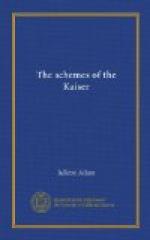At this very moment William is planning to add a permanent effective of 40,000 men to the tactical units. In return, he will promise Parliament and the country a provisional two years’ service, being quite capable of withdrawing his promise so soon as the vote has been secured.
Numbers, always numbers! It is the German Emperor’s only ideal, and he becomes further and further removed from any principle of selection. . . .
The German newspapers make a speciality of the fabrication of sensational rumours. I could not ask any better vengeance for our beloved country than to have their stories placed before the most loyal of Sovereigns, the most far-seeing of diplomats, of the politician the furthest removed from sordid calculations that the world knows or has ever known, that is to say, of the Emperor Alexander III. . . .
But all this is just a manoeuvre of the enemy who plays his own game, and it has no importance whatsoever beyond that which credulous and anxious people choose to give it. Inasmuch as the renewal of the Triple Alliance has produced a definite situation, which affords no opportunity for any of the combinations which might have resulted had it been broken up into independent parts, the Tzar with his usual foresight was naturally led to proclaim his rapprochement with France, and this he has done. What change has there been in the situation since Kronstadt? None at all, unless it be that Lord Salisbury has revealed something more of the nature of his intrigues at Sofia, and of the anti-Russian intentions of his Bulgarian policy. The King of Italy has surrendered himself a little more into the hands of the King of Prussia, placing at the disposal of William’s diseased restlessness further and inexhaustible sources of trouble and uneasiness for Europe.
July 9, 1892. [25]
It seems to me that the speech addressed by William to his new Admiralty yacht at the port of Stettin has not attracted sufficient notice. It is simply beautiful, a very choice morsel indeed. To show how little I exaggerate, I will ask my readers to study it in the actual text, and I would like to engage the services of the King of Prussia to collaborate in the Nouvelle Revue for a page in precisely the same style. Here is this little masterpiece of classic purity—
“Thou art ready to glide into thy new element, to take thy place amidst the Imperial war-ships, and thou art destined to carry our National Flag. Thine elegant construction, thy light sides, showing no sign of the heavy threatening defensive turrets, such as are carried by our war-ships destined to fight the foe, indicate that thou art consecrated to works of peace. Lightly, as on the wing, to cross the seas, bringing distant lands closer to each other, giving rest and recreation to workers, happiness to the Imperial children, and to the august mother of the country,—that is thine appointed task. May thy light artillery be worn by thee as an ornament and not as a weapon of war.




